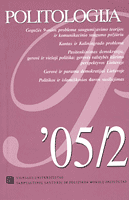Ekonominis balsavimas: trys tyrimų dešimtmečiai
Economic Voting: Three Decades of Research
Author(s): Gintaras ŠumskasSubject(s): Politics / Political Sciences
Published by: Vilniaus universiteto leidykla & VU Tarptautinių santykių ir politikos mokslų institutas
Keywords: aspects of economic voting in developing countries and Eastern and Central Europe
Summary/Abstract: Economic voting pioneers J. E. Mueller, G. H. Kramer, C. A. E. Goodhart and R.J. Bhansali published their papers in 1970. Since then more than 200 articles and books have been published. An article covers major aspects of economic voting, as well as the variety of models and research methods. The scope of models varies from simple reward-punishment, to a very complex one, which includes personal economic perceptions, reaction of the government and other variables. Research approaches also are very different, starting from the analysis of the linear relationship among macroeconomic and political data and ending up with the very sophisticated models combining different levels (micro and macro) and different methods of analysis. Retrospective vs. prospective and egotropic vs. sociotropic voting are the most discussed economic voting issues. There is more evidence supporting retrospective and egotropic voting patterns, but the opponents’ claim that these findings rest on the type of data used. Almost all the analyses of aggregate macroeconomic data point to retrospective and egotropic voting, while micro-level analyses indicate the opposite. Analyses of economic voting in developing countries and Eastern and Central Europe are still quite rare. The few available papers are discussed at the end. Despite of skeptical arguments that transitional economies are specific and economic vote modeling is not applicable there, the findings are encouraging. Economic voting patterns are quite strong. The majority of researches appear to be very complex. They analyze different electoral and party systems, combining several statistical methods and using various data sources at the same time. For that reason none of the classification is precise. I choose to group the literature by the main problems. This is not the perfect classification either, by is helps to browse through the articles while looking for some particular issue. This article covers only a part of numerous economic voting literature, but this is definitely a “lions share”. The reviewed articles are the most influential ones and their authors are the leaders in economic literature field.
Journal: Politologija
- Issue Year: 2003
- Issue No: 3 (31)
- Page Range: 59-83
- Page Count: 25
- Language: Lithuanian

